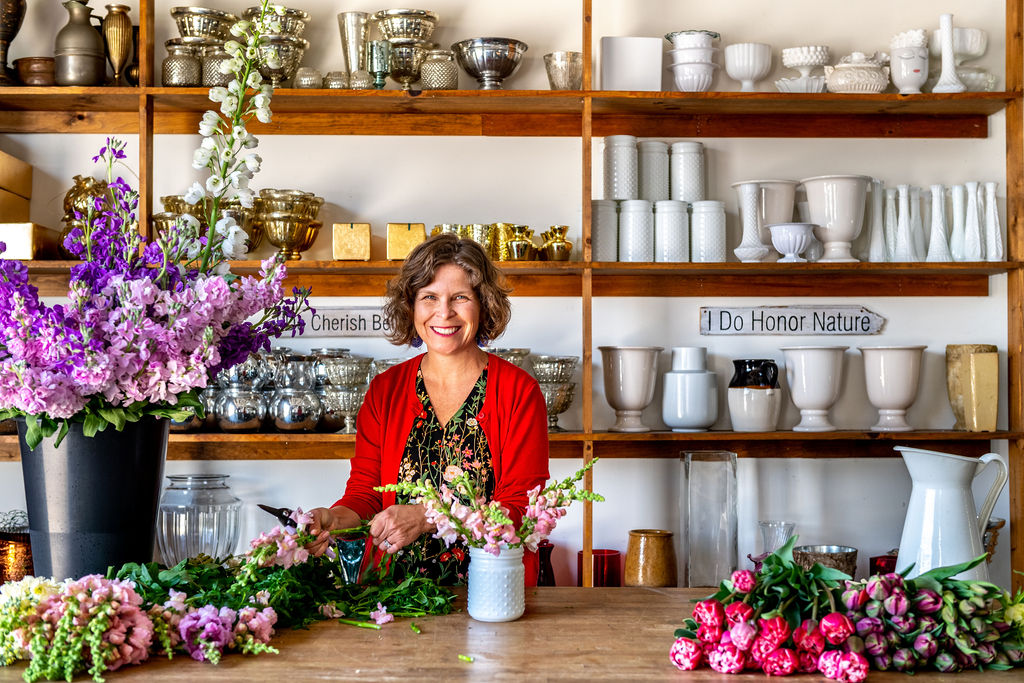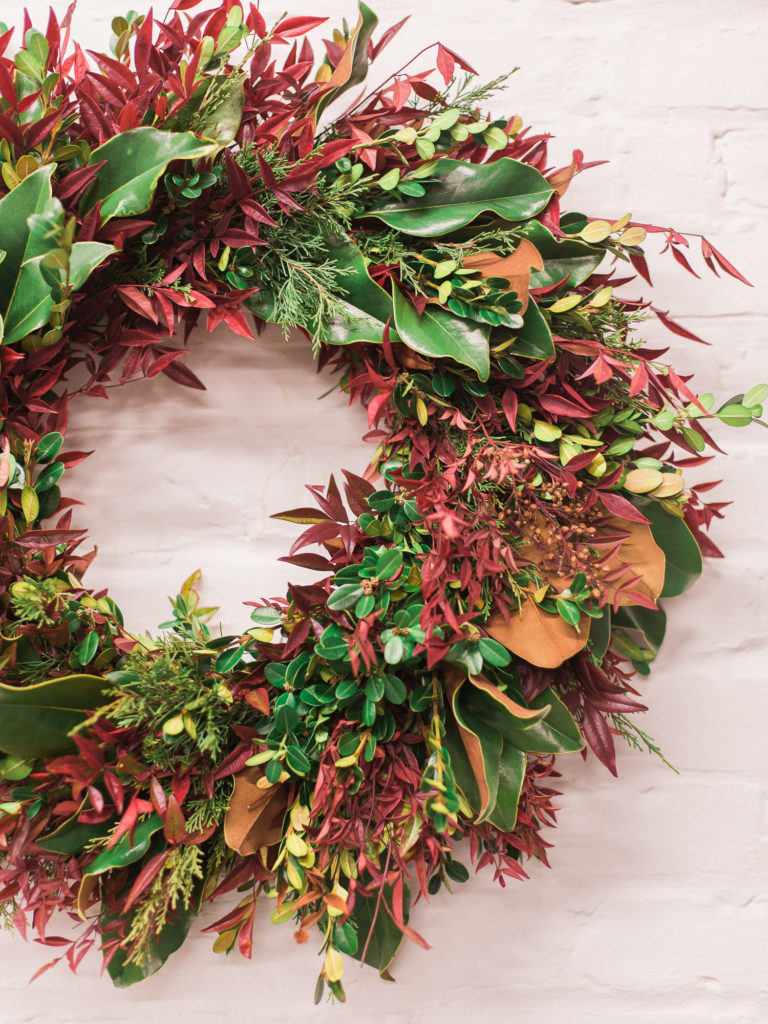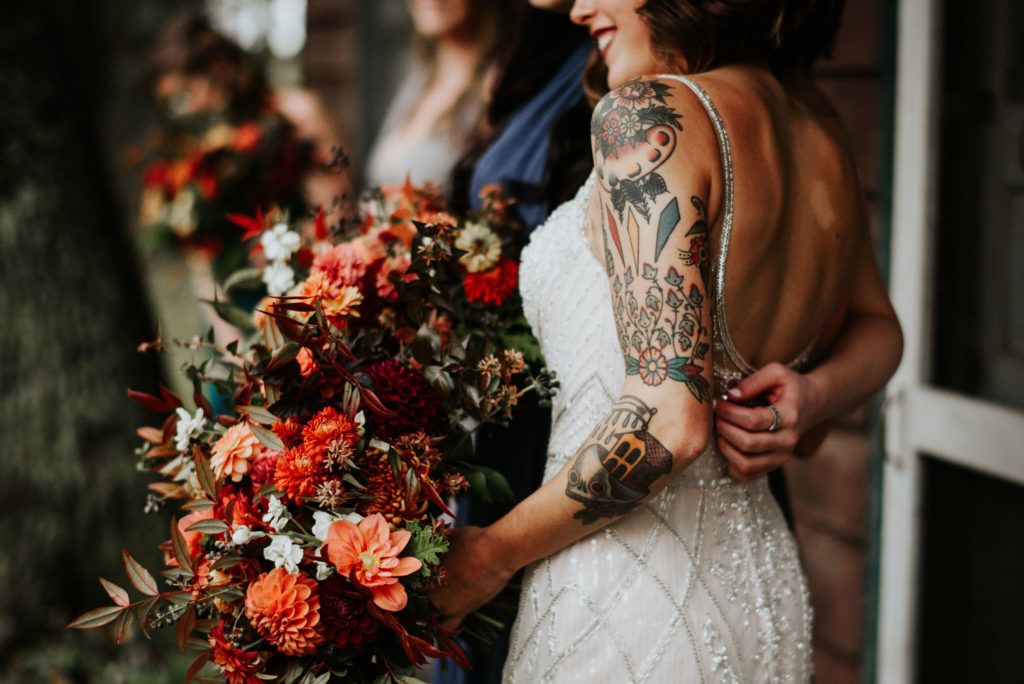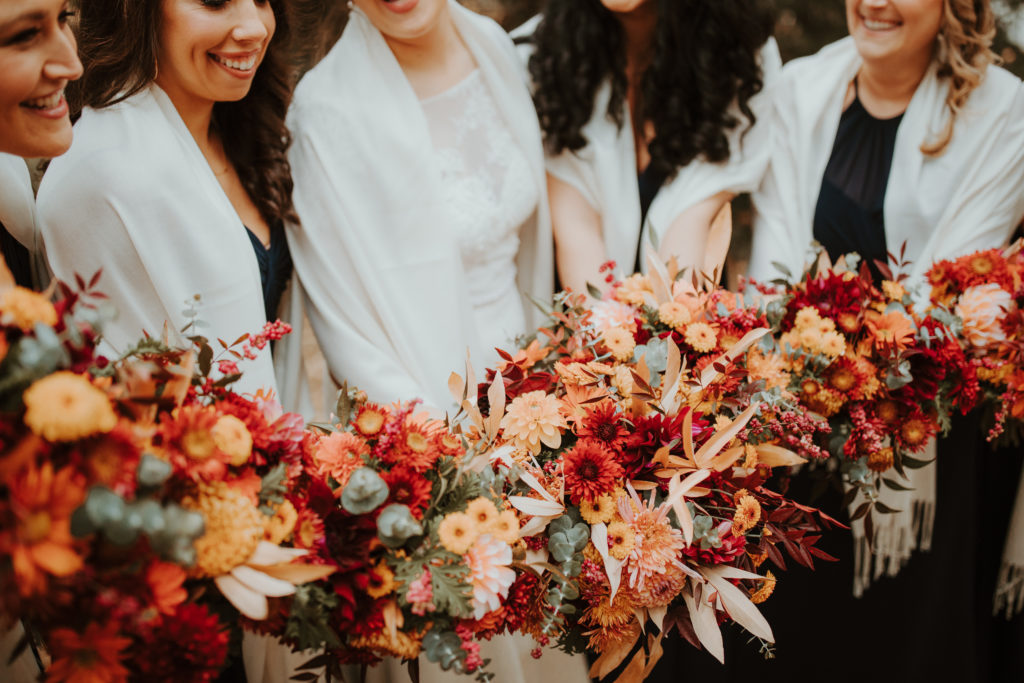Seasons Change: How A Local-Only Florist Works in the Winter
A Guest Post by Ellen Frost | Local Color Flowers
But the winter will crave what has gone
Will crave what has all
Gone away
– Future Islands (a Baltimore synthpop band – keeping it local)

Ellen Frost | Photo by Laura Chase de Formigny
There is a day each year when my business takes a turn. My growers call it “Frostmas.” For them, the day a hard frost kills all the flowers in their fields marks the beginning of some well-deserved rest. For me, that day means I need to source my flowers from growers farther away with the capacity for winter growing in the Mid-Atlantic.
My flower shop, Local Color Flowers, is in Baltimore, Maryland. We offer typical floral services just like our competitors: weddings, floral design classes, retail, deliveries, subscriptions, special events. How we differentiate ourselves is by exclusively sourcing all of our flowers, foliage, branches and berries from farms within 100 miles of Baltimore. We are committed to this even after Frostmas.

We do this because I was inspired to start my business after reading Flower Confidential by Amy Stewart. In our industry, where 80% of flowers purchased are grown overseas and 90% of domestic flowers are grown on the other side of the country, my local-only shop in Maryland stands out. Local flowers are our value proposition. They tell a story. They build relationships. They are different and special. My customers seek them out. And local flowers are not easy for me to find in the winter.
Our growers are in USDA Planting Zones 6b, 7a and 7b where winter temperatures below freezing are not uncommon. So, nothing delicate, my usual inventory, can survive the winter. The growers closest to us, the ones we reliably source from for most of the year, grow seasonally in the field. They can extend the season with only limited capacity in hoop houses and unheated greenhouses. First frost usually hits sometime in October, but we can never be sure. As the leaves fall, my phone becomes frost command center with a weather app always open and daily, early morning grower alerts reporting temperature damage to my orders. Inevitably, a 5AM text will gleefully (annoyingly) announce the end of field flowers for the season.

In preparation for winter sourcing, I start reaching out to my winter growers in September to start planning. These are growers with large greenhouses heated with steam or propane, acres of evergreens, flowering branches and other hearty ornamentals. We even have a year-round, indoor hydroponic grower (that’s science!). We re-connect and talk about anything new they are growing and my projections of needs for the winter. Many of these growers don’t sell to florists. I am their exception. I developed these relationships over years. They appreciate my business mission and dedication to our local industry. They go out of their way to ensure we have local flowers for the winter. I am grateful for the partnerships. We could not offer local flowers year round without them.
Logistics, supply, and products all change for my shop during the winter months. I need to account for the time and expense of additional transportation – some of our winter supply options do not offer delivery. I need to adjust our schedule and update our website and social media. I have to haul the wreath machine out from my home basement and schlep it to the shop. I need to educate some of our customers why I don’t have tulips yet, and how heirloom mums are just as beautiful and even more interesting. My designers have sappy hands. There are dislocated magnolia leaves, scattered pine needles, and loose berries rolling around everywhere! It couldn’t be more fun.

Same is boring. That is why I always keep my shop full of something new and wonderful. The winter provides something different, but also that craving for something gone away. It takes more work for our local-only shop to persist when the fields are barren, but that is when we flex our creative muscles to produce unique designs. Our winter products are some of our favorites, because we know what it took and how we worked so hard to make them happen.

Here’s a list of some of the great florals available in our region in the Winter:
November:
- heirloom mums, salvia, dahlias (greenhouse), sunflowers, snapdragons, stock, eucalyptus, winterberry (orange, yellow, red), ornamental cabbage, ornamental kale, sweet William, evergreens, red twig dogwood, nandina
December:
- evergreens, cut poinsettias, lilies, calla lilies, gerbers, dusty miller, eucalyptus, celosia, tulips, anemones, poppies, pussy willow, ornamental cabbage, ornamental kale, snapdragons, stock
January:
- evergreens, anemones, tulips, snapdragons, stock, freesia, dusty miller, eucalyptus, sweet William, butterfly ranunculus, paper whites, flowering branches, poppies, heirloom carnations
February:
- evergreens, anemones, tulips, snaps, stock, freesia, dusty miller, eucalyptus, sweet William, butterfly ranunculus
Study with Ellen Frost:
Growing Your Business with Local Flower Sourcing
Registration is open November 16-20, 2020
Class dates: January 4th – February 14th
Invigorate your sales and create new ones by building a community of local flower lovers that want to support and participate in your business and become your loyal customer. Learn how to source, use, build community, market, and sell locally grown flowers to grow your business.
Learn in this course:
- About the landscape of the cut flower industry
- Why local flowers? The motivation, definition, and goals
- How to build relationships with local growers
- The logistics of local flowers such as pricing, availability, etc.
- Marketing and selling local flowers
- Making your business a community asset
- Plus your questions answered in live Q&A sessions with your instructor
- View the course Syllabus here.
Course includes:
- 6 weeks of classes that include 16 hours of videos
- Each weekly class is made up of many video sessions
- PDF downloads and resources
- Live Q&A Group Coaching session on our private platform with Ellen that is recorded and added to the course library for viewing anytime
- Unlimited lifetime access to this entire course and its resources
- Optional Private Facebook Group for students to network with each other and to interact with instructors during the 6 week school period. After school is complete, students continue to be a member of the group and the instructors monitor for questions.
Course Facts:
- Registration closes Friday November 20, 2020 at 12 midnight EST
- Course offered again in Fall 2021
- Course is self-paced, watch at your convenience
- Re-watch anytime
- School starts Monday January 4, 2021 with Class 1 loading into your online library
- Each Monday for the next 5 weeks an additional Class automatically loads for a total of 6 classes
- Each weekly class is approximately 2-3 hours of short videos plus resources
- Live Q&A Group Coaching Sessions are held on Sundays at 8PM EST beginning January 10, 2021 for 6 regular sessions
- Plus 1 additional BONUS Wrap-up Q&A session 2 weeks after the last class
- Watch How Online Courses Work
- Frequently Asked Questions
CLICK HERE FOR MORE INFO ON ELLEN’S COURSE
Meet the instructor Ellen Frost:
Ellen Frost is sought-after for teaching, business consulting, podcasts, interviews, panels and speaking engagements both locally and nationally. She co-authors the column The Farmer and The Florist for The Association of Specialty Cut Flower Growers magazine. She owns and operates Local Color Flowers ,a flower studio which exclusively sources local flowers. Ellen founded her company in 2008 as a part-time wedding floral business to provide Baltimore area couples a more sustainable flower option for their celebrations. Over the past 12 years, Ellen Frost has grown Local Color Flowers into a thriving business adding floral design classes, corporate events, subscriptions, and retail as well as creative social and educational community events – all using 100% locally grown flowers. Ellen’s business is a vital contributor to Baltimore’s local economy and a vibrant community resource.
Learn more from Ellen Frost in our BB Podcast conversation with her! Click here to listen.
Comments:
Leave a Reply
Share your Thoughts:
Subscribe and stay connected
This site may contain copyrighted material the use of which has not always been specifically authorized by the copyright owner. It is being made available in an effort to provide educational information about all things related to floral design and production. It is believed that this constitutes a 'fair use' of any such copyrighted material as provided for in section 107 of the US Copyright Law. In accordance with Title 17 U.S.C. Section 107, the material on this site is available for viewing without profit to those who have an interest in reading or viewing the website information for educational purposes. If you wish to use copyrighted material from this site for purposes of your own that go beyond 'fair use', you must obtain permission from the copyright owner. If your copyrighted material appears on this web site and you disagree with our assessment that it constitutes "fair use," please contact us and we will remove it from our site.

[…] A version of this article was previously posted in Botanical Brouhaha. […]